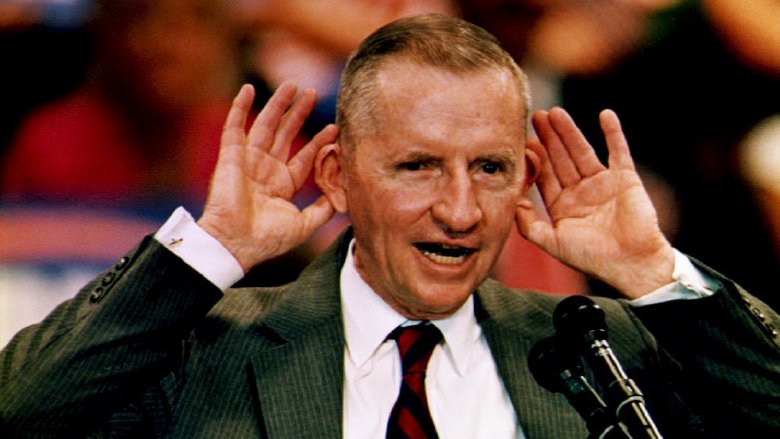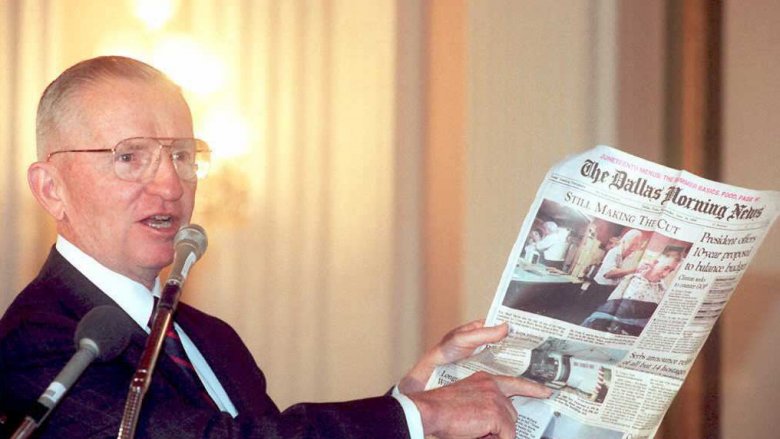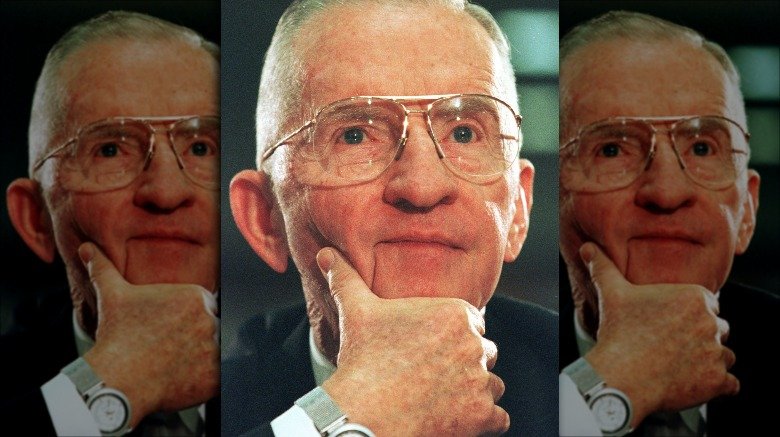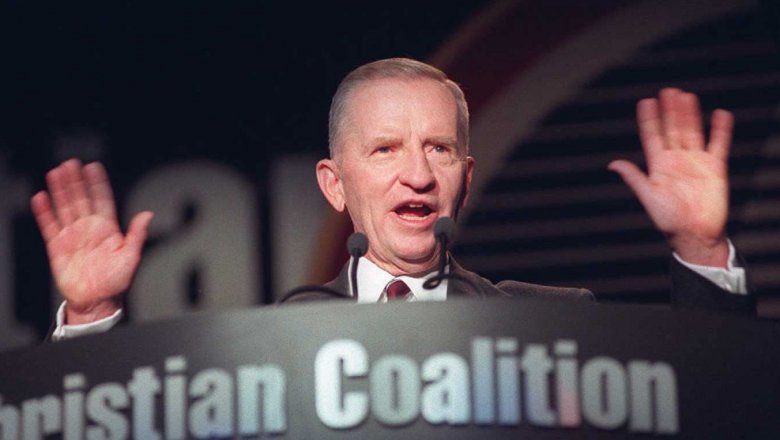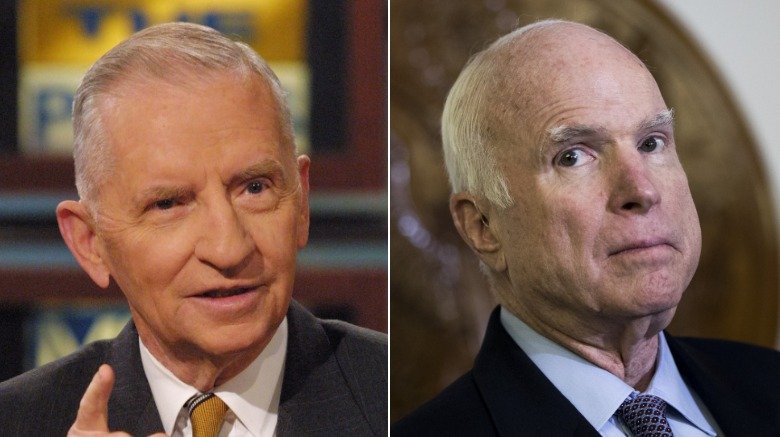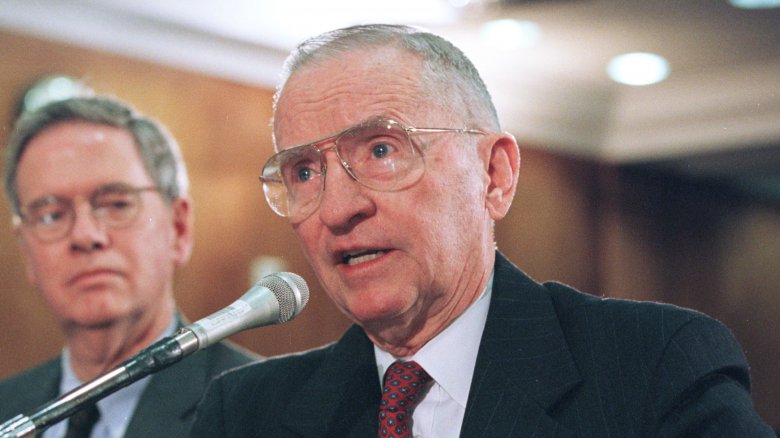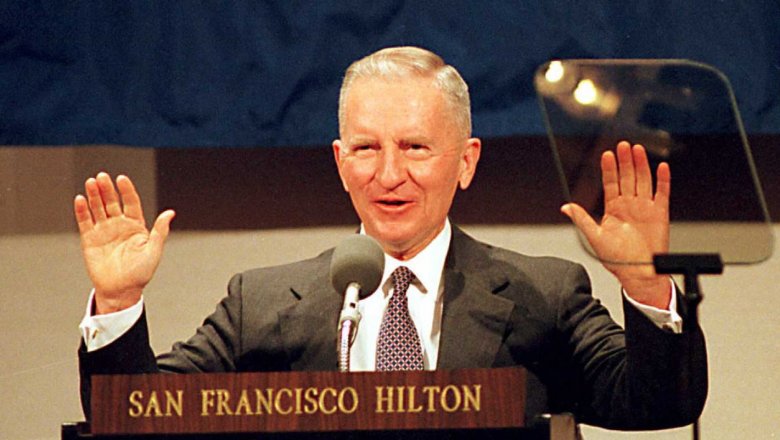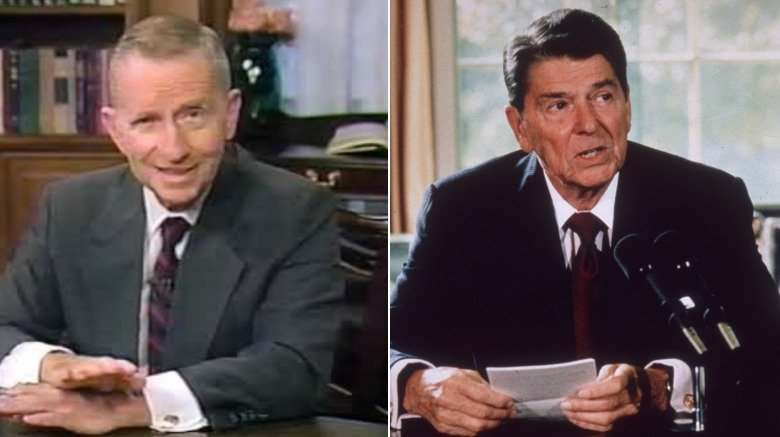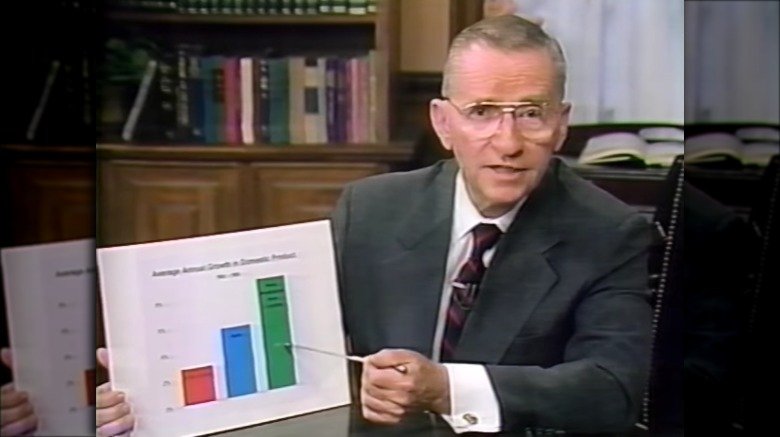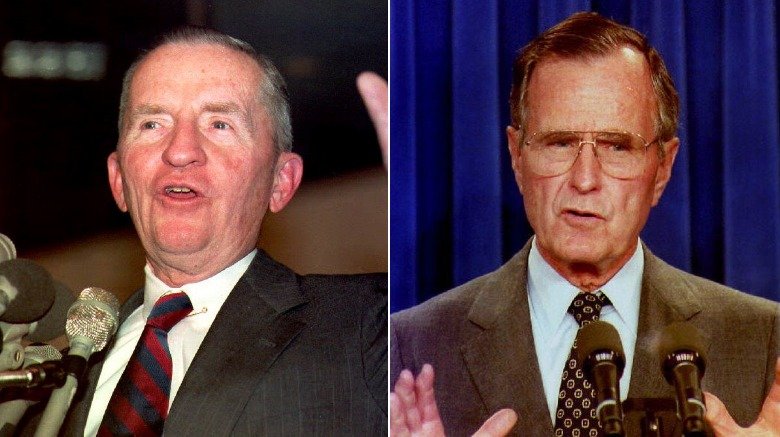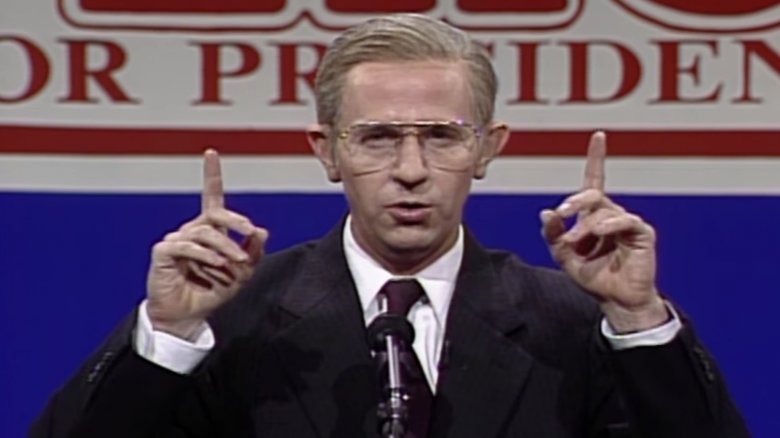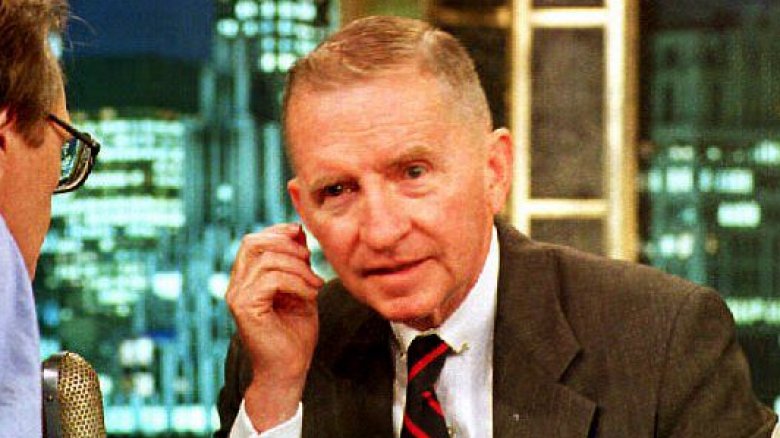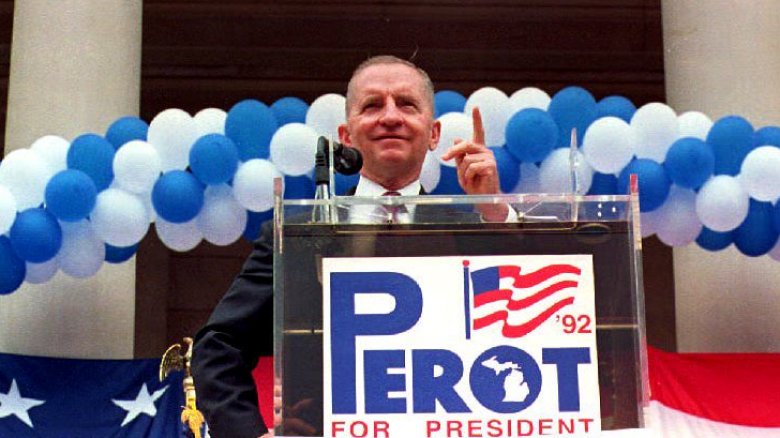The Untold Truth Of Ross Perot
On the issue of "what he wanted to be remembered for," billionaire Ross Perot said in 2016, "Aw, I don't worry about that." Nor should he have worried, because when he died in July 2019, people remembered him for doing great things. We don't just mean amassing enormous wealth through hard work or making us laugh vicariously through Saturday Night Live skits based on him. We're also talking about what Perot did with his time on Earth. Yes, much of that time was spent making billions of dollars, but the good he tried to do with those billions was priceless.
We're not saying he was perfect. (Who is?) But while many people talk the talk or tweet the tweet about helping people, Perot walked the walk and helped people who couldn't walk. When Army Captain Marc Meisner suffered debilitating leg injuries in Panama, Perot took it upon himself to buy Meisner a customized vehicle that enabled him to drive. During the Vietnam War, Perot arranged the rescue of more than 30 people. The value of such acts can't be measured in dollars and cents but in smiles and tears of joy. Ross Perot's life was defined by priceless kindness and the kinds of crazy experiences you have to read to believe.
Ross Perot was a Norman Rockwell painting come to life
It's impossible to paint a full picture of someone's life in a few sentences or even a whole article, but Ross Perot's lawyer, Tom Luce, gave a pretty vivid picture of Perot in one brilliant broad stroke: "I always thought of him as stepping out of a Norman Rockwell painting and living the American dream." If you had to guess which painting it was, you could do worse than guessing that it was the one Perot's mother hung over his desk when he was a boy. It depicted a praying Boy Scout, and as Perot told the Washington Post, "Rockwell painted what I strived to be."
The son of cotton broker and part-time horse trader Gabriel Perot and secretary Lula May Perot, Henry Ross Perot was born in Texarkana, Texas, in 1930, amid the Great Depression, a time when "scruffy, half-starved hobos used to jump the trains and come to the Perot house asking for food." Ross started working as a horsebreaker for his father at age six or seven. At age 12 he sought a job delivering papers for the Texarkana Gazette but was initially turned down. Already industrious, he offered to deliver papers to a black slum, which "no one had ever done." This was an era of segregation, but Ross' father ignored that and befriended black people, and Ross echoed that open-mindedness. And it didn't hurt that he delivered papers by pony, reportedly earning an impressive $40 a week.
How Ross Perot went from thousandaire to billionaire
Long before his presidential bids, Ross Perot was class president at the U.S. Naval Academy. Despite graduating almost literally in the middle of his class — 454th out of 925, per UPI — he was far above average to his peers, who voted Perot "best all-around midshipman." Fittingly, when he launched Electronic Data Systems Corp. in 1962 he ran a tight ship.
EDS filled a niche ignored by Perot's former employer, IBM. As Perot explained, hardware dominated 80 percent of the computer industry, and "IBM wasn't interested in the other 20 percent." Like his life, his company had humble beginnings. He started EDS with $1,000 from his wife, Margot. Perot promoted a workplace culture of military-like austerity. The employees were often former service members who wore crew cuts like Perot and were forbidden from sporting beards or mustaches.
Money began rolling in with the advent of Medicare and Medicaid. At one point EDS managed medical billing in six states. When the company went public in 1968 Perot became worth $350 million "overnight." In 1984 he sold control of the company for $2.5 billion and earned $700 million in a stock buyout. He later created Perot Systems Corp. When he died in 2019 he had an estimated net worth of $4.1 billion.
Ross Perot was the patron saint of POWs
During the Vietnam War, Ross Perot showed that his character was far richer than his bank account. In 1969, Bonnie Singleton pleaded for his help. Singleton had a 3-year-old son and a husband who vanished after being shot down in Vietnam. Perot recalled, "I was so touched looking at that little boy, we mounted a 90-day campaign," and the North Vietnamese admitted to imprisoning Singleton's husband.
Perot, who had financially backed Richard Nixon's presidential campaign, was asked by President Tricky Dick to try "to humiliate North Vietnam over its treatment of American POWs." Perot obliged but more importantly made a difference in the lives of those prisoners-of-war and their wives. According to UPI, he paid for four POWs' wives to travel to France for the Paris peace talks and waged a campaign called United We Stand, which aimed to deliver mail, medicine, food, and clothes to POWs. When North Vietnam rejected these efforts, Perot pledged to send Christmas gifts and supplies to North Vietnamese POWs instead to demonstrate his concern for the well-being of both North Vietnamese and American POWs. South Vietnamese POW Max Nguyen credited Perot's generosity with boosting the prisoners' morale, and during the fall of Saigon, Perot evacuated 32 of Nguyen's relatives, saving them from "certain death." Then he helped them "rebuild a happy and safe new life."
Ross Perot's friendship and rift with John McCain
When asked why she thought Ross Perot would spend his hard-earned millions trying to help Vietnam POWs and their families, the wife of one of those prisoners called him a "guardian angel." Perot certainly earned his halo helping Carol McCain, the first wife of late Senator John McCain. Per Newsweek, while John was enduring a torturous five and a half years as a POW in Hanoi, Carol was gravely injured in a car accident. Perot paid Carol's medical bills, laying the foundation for his friendship with John McCain. That friendship would be strained by disagreements over POWs and John's marriage to Carol.
In 1980 John divorced Carol and almost immediately married his second wife, Cindy, whom he'd met the previous year. Perot reportedly "treated John McCain coolly" sometimes after the divorce, and in 2008 Perot issued a scorching criticism: "After he came home, he walked with a limp, she [Carol] walked with a limp. So he threw her over for a poster girl with big money from Arizona."
Perhaps their nastiest clash came over Perot's insistence that the Nixon administration knowingly left captive Americans behind in Laos after the Vietnam War and the government covered it up. Responding to those assertions in 1995, John called Perot "nuttier than a fruitcake," sparking an argument that got so heated that the men "didn't speak again for several years."
Perot was right about the U.S. abandoning POWs
When Perot ran for president in 1992, opponents weaponized his views about Vietnam War POWs, portraying him as "obsessive" and "conspiratorial," per the Washington Post. Perot insisted the Nixon administration knowingly left Americans in Laos for expediency's sake after the war, that prisoners were sent to the Soviet Union to be used as lab rats, and that the U.S. government orchestrated a cover-up. Such claims sounded like the yammering of a madman to people like John McCain, but Perot was largely (if not entirely) right.
In August 1992 Perot had what the Sun-Sentinel described as "a series of feisty, often impatient exchanges with senators" over the POW issue. He acknowledged that "hoaxers" certainly jeopardized the legitimacy of his efforts, but he maintained that if even one prisoner had been left behind, there was "absolute obligation to bring that person home."
A month after Perot's impassioned plea, former defense secretary James Schlesinger and former Pentagon head Melvin Laird confirmed what seems obvious in retrospect. Nixon, the guy who lied about Watergate and covered up a murder to hide a bombing campaign, also lied about American POWs. Despite Nixon claiming otherwise, U.S. officials believed that pilots imprisoned in Laos hadn't been returned with the rest of the POWs during Operation Homecoming. Moreover, Russian President Boris Yeltsin claimed his country had indeed received American POWs from Vietnam.
Ross Perot's Iran rescue mission didn't really happen as advertised
If something seems to be too good to be true, it's probably a movie based on a true story. As we all know by now, the truth in those stories gets embellished, pared down, or downright flip-flopped for dramatic effect. The same apparently holds true for On the Wings of Eagles, the TV miniseries based on the thriller written by best-selling author Ken Follett, which is based on the story of how Ross Perot purportedly organized a jailbreak to rescue two Electronic Data Systems employees arrested in Iran during the Iranian Revolution.
In the movie Perot "assembles a crack commando team" that stages a jailbreak, guns down guards, and evades capture "by blowing up an ammunition dump." But as screenwriter Sam Rolfe revealed, "When you get into the derring-do elements, that was me. They didn't do that." In fact, they didn't do a raid at all. As detailed by the Chicago Tribune, the real team nixed the rescue mission because it was "too dangerous." Perot, meanwhile, told the State Department that he instructed one of his Iranian EDS employees to persuade Iranian revolutionaries to stage a jailbreak.
Even planning to free the EDS employees merits scrutiny. Perot's workers weren't hostages like the U.S. embassy workers detained at the same time. Rather, they were incarcerated by the government of U.S. ally Shah Mohammed Reza Pahlavi for alleged corruption.
Ross Perot's brief involvement in Iran-Contra
Ronald Reagan was infamously dubbed the "Teflon President" because scandals just didn't seem to stick to him. Perhaps the most unctuous example of Reagan's nonstick presidency was Iran-Contra, which Bill Moyers excoriated as "nothing less than the systematic disregard for democracy itself ... in effect, a coup." Weirdly, Ross Perot was briefly mixed up in that mess.
For a brief refresher, the Iran-Contra controversy revolved around the Reagan administration's dubious efforts to secure the release of Americans taken hostage in Lebanon by Iranian terrorists. As PBS recounted, Reagan was desperate to free the Americans but was hamstrung by his own policy of not negotiating with terrorists. Ultimately, he violated an embargo by approving the sale of weapons to Iran, which wanted firepower for its war with Iraq. (Then he lied about it for a while.) The terrorists released hostages but then took more because terrorists don't play fair. Where does Ross Perot fit into all of this?
The embargo-breaking deal with Iran wasn't the only illegal thing the administration did. It also accepted $1 million of Ross Perot's money, hoping to pay a ransom for the hostages. Using civilian money for such a transaction violates federal law, UPI explained. Perot didn't know this and said Reagan personally thanked him for the money.
Ross Perot did NOT cost Bush the election
Ross Perot ran for president twice, but as Hollywood taught us, the sequel usually pales in comparison to the original. Perot's original 1992 run was the stuff of political and comedic legend. He paid for "30-minute infomercials, complete with charts," spoke with an almost confusing folksy flair, dropped out of the race, and then reentered it.
Many pundits see parallels between Perot, who ran as a populist Independent, and President Donald Trump, who ran as a populist Republican. To quote Democratic strategist James Carville, "If Donald Trump is the kind of Jesus of the disenchanted, displaced non-college white voter, then Perot was the John the Baptist of that sort of movement." FiveThirtyEight noted that unlike Trump, Perot ran as a third-party candidate. (Also, Perot ran on lowering the national debt while Trump focused on immigration and wall-building.)
Despite his third-party status, Perot won a whopping 19% of the popular vote, and many said he paved the way for Bill Clinton's presidency by siphoning votes from incumbent George H.W. Bush. That's most likely false. Texas Monthly pointed out that Bush had lost popularity because of a recession and broken economic promises, and exit polls suggested that Perot supporters would have been split evenly between Clinton and Bush had Perot not run. Per the Spectator, when Perot entered the race, Clinton's poll numbers slid far more than Bush's.
Did Ross Perot get duped into dropping out of the 1992 race?
Though Ross Perot never became U.S. president, 1992 was his not-quite-Cinderella story. A guy who clawed his way up from poverty to become a billionaire philanthropist tried to become the belle of the biggest political ball of them all and actually seemed to have a chance despite running as an independent. His strategy "to use money to run against money" and cast the dominant parties as two sides of a corrupt coin had real appeal. But given his eccentricities, vagueness on policy, and political outsider status, he was a long shot. However, that shot might not have been so long if Perot hadn't temporarily dropped out of the race.
As Newsweek detailed, Perot canceled his Oval Office bid after accusing the George H.W. Bush campaign of trying "to sabotage his daughter's August wedding by releasing a fake photo of her — reportedly in a lesbian situation — and by wiretapping his phones." You can't make this stuff up, folks. Well, on second thought you can, and somebody did. According to Perot aide Scott Barnes, he made it all up and Perot thought it was real.
Barnes, described by Newsweek as an "Arizona dress-shop owner and conspiracy theorist," spun tons of outlandish tales about espionage after being discharged from the Army in 1974. In 1997 Barnes admitted that he concocted a lie about the Bush administration trying to smear Perot in hopes of painting Bush as a dirty trickster. If true, his plan backfired and tricked Perot into halting his campaign, which hurt his momentum.
Ross Perot enjoyed all those SNL sketches
Dana Carvey did a masterful job impersonating Ross Perot on Saturday Night Live in 1992, mostly because Perot was already hilarious. Footage of the unorthodox billionaire just being himself made a huge impression on Carvey, who recalled, "I thought, oh my God, this is amazing — a fully formed, comic character." Even one of Carvey's most ridiculous Perot-isms, "You can't put a porcupine in a barn, light it on fire, and expect to make licorice!" has an air of authenticity. Compare that to this actual Ross Perot quote: "It's like a crazy aunt in the basement. Everybody knows she's there, but nobody talks about her." Amazing indeed.
The real Ross Perot laughed right along with us. In fact he personally invited his SNL counterpart to join him in Texas on election night. The fact that he was such a great sport about being teased on national television shouldn't come as a shock. Despite the bizarre "quirky stream-of-consciousness delivery" he was known for, Perot demonstrated a humorous self-awareness during a presidential debate. Poking fun at the half-hour ads he famously ran, Perot remarked, "I love the fact that people will listen to a guy with a bad accent and a poor presentation manner talking about flip charts for 30 minutes because they want the details."
When Ross Perot took on the Texas education system
It's easy to forget that Ross Perot's political stardom didn't start with his presidential aspirations. Before he set his sights on the White House, he tried to reform Texas schools. As recounted by Education Week, in 1983 Texas Governor Mark White tapped Perot to lead the Select Committee on Public Education (SCOPE), a commission to examine issues like teacher pay and education quality. Perot threw himself and his bank account into the endeavor, spending somewhere between $500,000 and $2 million of his own dough on top of $68,000 of publicly allotted money to conduct the study.
Perot, who was very opinionated and outspoken on the issue of education, railed against extra-curriculars, coaches' salaries, and, bizarrely, "a student who missed 32 days of the previous school year entering his prize chicken in farm shows." Even so, he was said to show a willingness to learn and compromise. In the end, his recommendations were a mixed bag in terms of reactions.
SCOPE's proposals included performance-based bonuses and pay raises for teachers, along with limited class sizes, in exchange for teacher competency tests, toughening accommodation standards, lengthening school days and the school year, and providing full-day kindergarten and preschool for underprivileged children. Some people were irate about the changes and sent the governor death threats and urine samples. Mark White wasn't reelected.
How Ross Perot turned one of the A's in 'NAACP' into anger
Perot had an endearingly weird way of expressing himself. When he ran for president in 1992, he showed his disdain for negative campaigning by saying, "Let's get off mud wrestling" and conveyed the go-getter mentality he wanted to bring to the White House with the line, "Don't just sit here slow dancing for four years." And who can forget his predicted "giant sucking sound of jobs being pulled out of" America by NAFTA? But even a treasure trove of charming quotes says regrettable things occasionally.
In 1992 Perot accidentally pissed off members of the NAACP during a campaign speech. According to the Associated Press, despite espousing values like racial diversity during his talk, he made the mistake of saying "you people" and "your people" in reference to black people. Some in the crowd protested, but Perot — either not hearing or not understanding them — thanked them and used the problematic phrasing again. One of the interrupters later explained, "'Your people' sounds primitive."
NAACP President Rupert Richardson said Perot's language, while not intentionally racist, was still off-putting. Not everyone objected, though. Some NAACP members appreciated Perot's "unpolished," non-pandering speaking style. Perot, upon discovering that he had angered some of his listeners, apologized.
